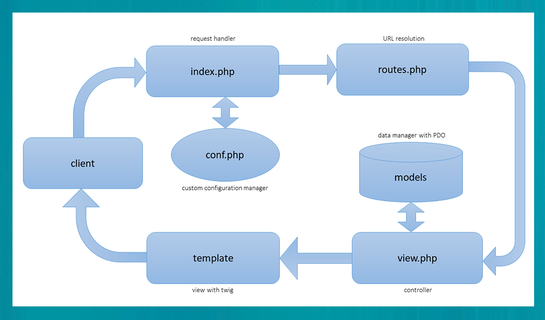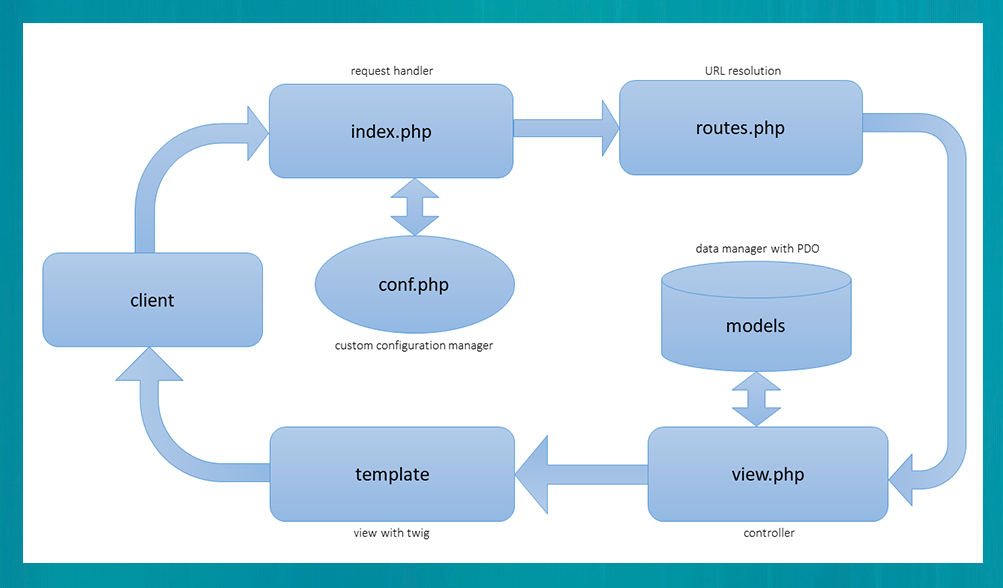ArtWeb
ArtWeb is a fast, secure, scalable web framework for PHP, using Symfony components with the best practices of MVC.
It's easy to start:
<?php
require_once('../ArtLibs/Application.php');
use ArtLibs\Controller;
$app = new \ArtLibs\Application();
class test extends Controller {
function viewTest($params, $app) {
$app->setTemplateData(array('body_content' => 'Hello World'));
$this->display($app, 'home.twig');
}
}
$app->getRouteManager()->dispatchUrl(
array('/test' => './test/viewTest')
);

Features
- The initial setup is very small but scalable. It can be used for very large project with more components easily.
- The project can be extended by adding any number of components, installed and maintained with
composer. - More static libraries and components can be added in project specific static container.
- The code and structure adheres to the proven best practices of OOP and MVC, creating highly maintainable code.
- The operation flow and points of execution makes debugging easier.
- The Route manager is flexible and mimics functionalities of proven flexibility of development such as Django.
- It contains a flexible and expendable Configuration manager that handles system values along with custom user values.
- The datamanager is adaptable to any other ORM or SQL builder with any DBMS, including MySQL, PostgreSQL, SQLite etc.
Requirements
Requires PHP 5.3 or greater, composer 1.2 or greater.
Installation instruction
The following steps are applicable in both Windows and Linux (*nix) platforms, while git, php etc., are installed and accessible in command line.
-
Step 1. The copy of ArtWeb for your use can be obtained by making a clone from github. Assuming the git is installed the following command can be used:
$ git clone https://github.com/aazhbd/ArtWeb.gitThis creates a folder named "ArtWeb" which can be renamed to fit necessity.
-
Step 2. The components for the framework has to be installed and/or updated through composer. Assuming PHP is installed in the commadline, the composer itself can be obtained by following command:
$ php -r "readfile('https://getcomposer.org/installer');" | phpWhile having the composer.json file obtained in the ArtWebApp folder and composer.phar is downloaded in the same directory, the following can be used to install the components:
$ php composer.phar installThis should create a vendor folder, and should automatically integrate itself with rest of the library. And the setup is ready to use.
-
Step 3. Changing the browser to pointing the webroot folder should open an initial page, assuming conf.php and routes.php are as downloaded. This can be sorted by creating a virtualhost or changing apache DocumentRoot to point to webroot folder.
Change Configuration: There is a conf.php file that contains most common configuration values, like database credentials, paths for different folder etc., these can be changed to fit particular environment.
Change Routes/URLs: There is a routes.php file that contains the mapping of urls with methods. More comma-separated key => value pairs can be added to address any number of urls.
Anytime if any of the components needs to updated and/or added the following can be used:
$ php composer.phar update
This is should create a clean initial setup for any Web Application software. It could be useful to be notified of any exceptions so that fixes can be added.
Components
An initial installation contains,
- Symfony 3 components
- FluentPDO is used with PDO database abstraction layer
- Twig is used as Template manager
- JQuery and JQuery UI is used for front end controls including validation
- Editor formatting with markdown
License
The code is released under MIT License.
Contact
Discuss about the project with a tweet or share on Facebook.
Abdullah Al Zakir Hossain
- Email: [email protected]
- Profile: https://de.linkedin.com/in/aazhbd
